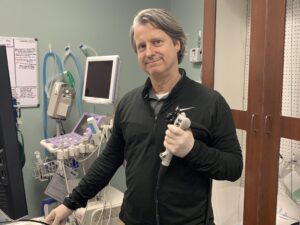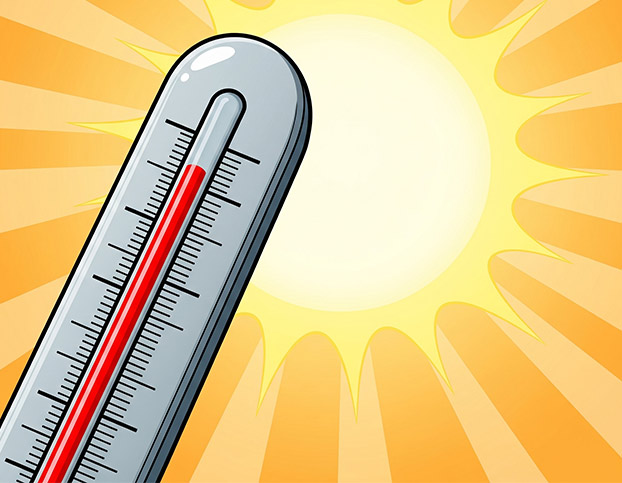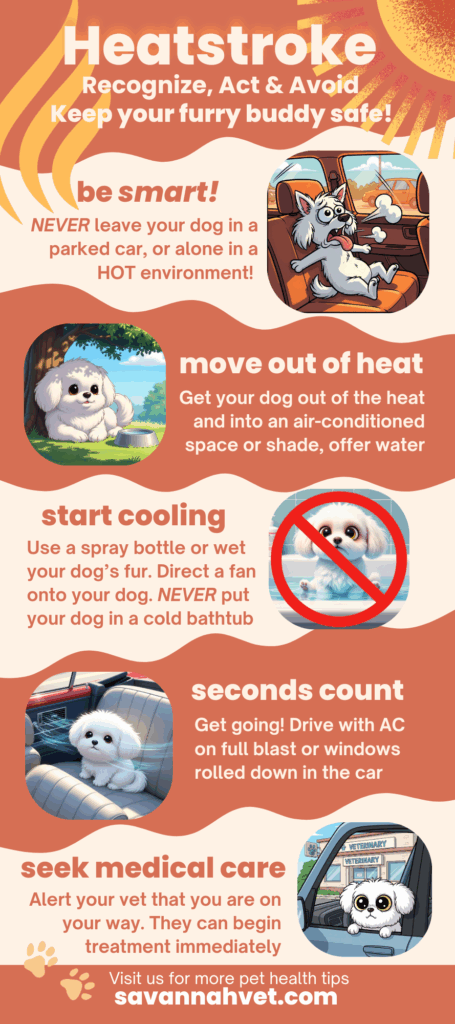The infamous Savannah humidity and soaring temperatures can quickly turn dangerous for our furry companions. Heatstroke is a life-threatening emergency for pets, and as responsible Savannah pet owners, understanding its causes, symptoms, and prevention is crucial.
What Exactly Is Heatstroke?
Heatstroke isn’t just about a pet feeling a bit too warm. It’s a severe condition characterized by a dangerously high body temperature, typically above 106F. This extreme heat causes direct thermal injury to organs, triggering a cascade of inflammatory responses and potentially leading to widespread organ failure.
Unlike a fever, where the body’s internal thermostat raises the core temperature set point (for example, in the presence of an infection), heatstroke occurs when the body’s normal cooling mechanisms simply can’t keep up with the heat it’s generating or absorbing.
The Two Main Types of Heatstroke
Heatstroke in pets is either non-exertional, caused by exposure to hot environments (like a parked car), or exertional, resulting from strenuous exercise in warm conditions.
Why Can’t My Pet Just Cool Down Like I Do?
Humans primarily cool down through sweating. Our furry friends, however, rely on different mechanisms. Dogs mainly cool down by panting. They also release some heat through their paw pads.
For pets in Savannah’s notoriously humid climate, panting becomes especially critical. With high humidity and as the air temperature approaches or exceeds a pet’s body temperature, panting becomes insufficient, making Savannah pets particularly vulnerable to overheating.
Who Is Most at Risk? Identifying Savannah’s At-Risk Pets
While any pet can suffer from heatstroke, certain factors and breeds are more prone, especially in a climate like Savannah’s:
- Activity: Picture a dog catching a Frisbee over and over again on a sunny, August afternoon at Forsyth park. This could lead to heatstroke, and even death.
- Confinement: Leaving a pet unattended in a vehicle, garage, or any poorly ventilated space is a primary cause of heatstroke and is extremely dangerous. This is particularly true in places like Savannah.
**Tip: Preventing Accidental Pet Confinement
It’s easy to get distracted, but there are simple ways to ensure your pet is never forgotten:
Utilize Technology: Many smartphones and smartwatches offer location-based reminders. You can set an alert to pop up when you arrive at a specific destination, reminding you that your pet is in the car.
Implement the “Buddy System”: If technology isn’t an option, ask a friend or family member to be your “buddy.” Arrange for them to expect a text from you once you and your pet have safely arrived at your destination. If they don’t receive your message, they’ll know to check in on you.
- Brachycephalic Breeds: These “flat-faced” breeds, like Bulldogs, Pugs, Boston Terriers and Pekingese have abnormal upper airways that make breathing and panting less efficient. They are at significantly higher risk. If you own one of these breeds in Savannah or the Lowcountry, extra vigilance is crucial.
- Sporting Dogs: These athletes may also be predisposed due to their active nature.
- Obesity: Fat acts as insulation, and can compromise normal breathing. Talk to your vet about weight loss tips.
- Upper Airway Abnormalities: Conditions like laryngeal paralysis, or a collapsing trachea can impair a pet’s ability to breathe and, consequently, pant effectively.
**Tip: If your dog “normally” snores, has loud breathing or coughs excessively, not only are these risk factors for heatstroke, you should also talk to your vet about causes and treatment options to help them breathe more easily.
- Prior Heatstroke History: Be aware of pets who have experienced heatstroke before may be more prone to future episodes.
The Alarming Impact of Heatstroke on the Body
When a pet gets heatstroke, their body temperature becomes dangerously high, leading to a rapid and severe shutdown of their systems. This causes widespread cell and brain damage, weakens the heart, and disrupts blood clotting, which can lead to life-threatening bleeding.
This extreme stress on the body often results in a full-body inflammatory response and, eventually, multiple organ failure. Organs like the gastrointestinal tract (leading to bleeding and infections), kidneys, heart, lungs, and liver can all stop working properly.
Recognizing the Signs: When to Act Immediately
Time is critical in heatstroke cases. Recognizing the clinical signs early can be life-saving. If your pet has been out in the Savannah heat and you observe any of the following, seek immediate veterinary attention:
- Excessive Panting: Much more rapid and forceful than normal.
- Difficulty Breathing: Labored breathing, gasping, or noisy breathing.
- Hypersalivation: Thick, ropey drool.
- Bright Red or Pale Gums: Gums may initially appear bright red, then become
- Vomiting (sometimes with blood) or Diarrhea (sometimes with blood).
- Wobbliness, Disorientation, or Incoordination: Appearing confused or unsteady.
- Collapse or Weakness: Inability to stand or move.
- Seizures: Uncontrolled muscle contractions.
- Stupor or Coma: Unresponsive.
- Elevated Body Temperature: Feeling extremely hot to the touch.
- Petechiae or Ecchymoses: Small red spots or larger bruises on skin/gums, indicating bleeding disorders.
What to Do in a Heatstroke Emergency: First Aid at Home
If you suspect your pet has heatstroke, every second counts. Begin first aid measures immediately while simultaneously calling your local Savannah veterinarian or the nearest emergency clinic. Time is of the essence when dealing with heatstroke in Savannah’s demanding climate.
- Move to a Cooler Environment: Get your pet out of the heat and into an air-conditioned space or shade.
- Start Cooling: The most efficient way to reduce body temperature is evaporative cooling.
- Mist with Room Temperature or Cool Water: Use a spray bottle or gently wet your pet’s fur.
- Use a Fan: Direct a fan onto your pet.
- Never Use Ice or Ice Water Baths: This causes blood vessels near the skin to constrict, trapping heat in the core of the body.
- Avoid Wet Towels (unless actively fanning): They can insulate if air can’t circulate.
- Do Not Use Rubbing Alcohol.
- Offer Small Amounts of Water: If able to drink, offer cool (not cold) water. Do not force them.
- Drive with AC On Full Blast: Keep the air conditioning on full blast or windows rolled down in the car.
- Call Ahead: Alert your veterinarian that you are on your way. This allows them to prepare for your arrival and begin treatment immediately.
What to Expect at the Vet Clinic for Heatstroke
If your pet suffers from heatstroke, getting them to a vet immediately is crucial. The veterinary team will jump into action to assess and quickly treat your pet.
- Diagnosis: When you arrive, the vet will quickly take your pet’s temperature and perform a physical exam to check for signs like shock, dehydration, bleeding, or neurological issues. They’ll also run blood tests to check for issues with blood cells, organ function (like kidneys and liver), blood sugar, electrolytes, and clotting ability. They may also check blood pressure, and perform an ECG.
- Treatment: Heatstroke treatment is intense and focuses on cooling your pet and supporting their organs. Here’s what they’ll do:
- Careful Cooling: They’ll actively cool your pet, but stop once their temperature reaches a safe range (102-103.5°F) to prevent overcooling.
- IV Fluids: Your pet will get fluids through an IV to fight dehydration, aid in cooling and help increase blood flow to organs.
- Oxygen: They’ll provide oxygen, and for severe cases, even use a breathing tube and a machine to help them breathe.
- Medications: Depending on your pet’s needs, they may receive:
- Glucose for low blood sugar.
- Antibiotics to prevent secondary infection.
- GI protectants to prevent stomach and intestinal problems.
- Treatments for clotting issues, like fresh frozen plasma transfusion.
- Medications for heart rhythm problems.
- Nutrition: They’ll ensure your pet gets early nutritional support.Close Monitoring: Your pet will be continuously monitored, including their vital signs, blood pressure, heart, and lab results.
Prevention Is Key: Keeping Your Pet Safe
The best treatment for heatstroke is prevention. Here are crucial steps every pet owner in Savannah should take:
- Never Leave Your Pet in a Parked Car: This is the most common cause of heatstroke and can be fatal in minutes, even on seemingly mild days in Savannah.
- Provide Constant Access to Shade and Water: Outdoors, ensure a shady spot and fresh, abundant cool water in your Savannah yard or at a park like Daffin Park.
- Limit Exercise During Hot or Humid Weather: Avoid activities during the hottest parts of the day. In Savannah, this often means walking your dog before 8 AM or after 7 PM during peak summer months. Consider indoor playtime or short, frequent potty breaks.
- Bring Them Inside: On hot and humid days, keep pets indoors, ideally air-conditioned.
- Walk on Pavement Carefully: Savannah’s historic sidewalks can reach scorching temperatures. Test the pavement with your hand; if it’s too hot for your hand, it’s too hot for your pet’s paws. Consider booties or walking on grass.
- Maintain a Healthy Weight: Improve their ability to thermoregulate.
- Regular Veterinary Check-ups: Address any underlying health conditions.
- Utilize Savannah’s Pet-Friendly Indoor Options: Explore air-conditioned pet-friendly stores (like some hardware stores, PetsMart, etc) for a short ‘walk’ indoors, or an afternoon at one of Savannah’s indoor doggie day care facilities.
In Conclusion
Heatstroke is a terrifying, but often preventable emergency. By understanding the risks, recognizing the signs, and implementing preventive measures, you can reduce the chances of your beloved furry buddy becoming a victim in Savannah’s challenging climate. Always prioritize their safety and comfort, and never hesitate to seek immediate veterinary care if you suspect heatstroke. Your vigilance can make all the difference in keeping your furry family member cool, healthy, and happy all summer long in the “Hostess City of the South”.

Author:
James Woods DVM, MS, DACVIM (SAIM)
Ph: (912) 721-6410
Contact Us

